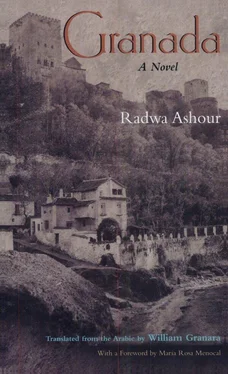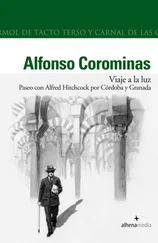Radwa Ashour - Granada
Здесь есть возможность читать онлайн «Radwa Ashour - Granada» весь текст электронной книги совершенно бесплатно (целиком полную версию без сокращений). В некоторых случаях можно слушать аудио, скачать через торрент в формате fb2 и присутствует краткое содержание. Год выпуска: 2003, ISBN: 2003, Издательство: Syracuse University Press, Жанр: Современная проза, Историческая проза, на английском языке. Описание произведения, (предисловие) а так же отзывы посетителей доступны на портале библиотеки ЛибКат.
- Название:Granada
- Автор:
- Издательство:Syracuse University Press
- Жанр:
- Год:2003
- ISBN:9780815607656
- Рейтинг книги:5 / 5. Голосов: 1
-
Избранное:Добавить в избранное
- Отзывы:
-
Ваша оценка:
- 100
- 1
- 2
- 3
- 4
- 5
Granada: краткое содержание, описание и аннотация
Предлагаем к чтению аннотацию, описание, краткое содержание или предисловие (зависит от того, что написал сам автор книги «Granada»). Если вы не нашли необходимую информацию о книге — напишите в комментариях, мы постараемся отыскать её.
Granada — читать онлайн бесплатно полную книгу (весь текст) целиком
Ниже представлен текст книги, разбитый по страницам. Система сохранения места последней прочитанной страницы, позволяет с удобством читать онлайн бесплатно книгу «Granada», без необходимости каждый раз заново искать на чём Вы остановились. Поставьте закладку, и сможете в любой момент перейти на страницу, на которой закончили чтение.
Интервал:
Закладка:
“I don’t want to work in the bathhouse.”
“What do you want? To run around with musicians and get drunk and sing?”
“That’s better than working in a bathhouse!”
His father slapped him on the face. Young people can be hard, they can be foolish, and they can be blind. Only now he understood what his father had feared. It wasn’t just a bathhouse but a family history, and he was the only one left to preserve it. He felt the tears swelling in his eyes. His father died while he kept company with musicians playing his lute. When he found out, he returned to his mother. She gave him the key. He opened the bathhouse and refurbished it. He was eighteen years old.
Forty years he’s been holding onto this key that his father once carried, and before him his father and his father’s father, opening that door that the carpenters worked on so laboriously to carve that plain slab of wood into a medley of geometric patterns and incisions that you immediately recognize as though you were seeing your own reflection in a mirror.
Abu Mansour got up and sauntered toward the central foyer in the middle of which was an octagonal pink stone pool with a marble spout in the shape of a flower from which the water gushed out. It was he who added the pool and remodeled the wash rooms on the sides. He was also the one who bought the lantern made of leaded glass.
Abu Mansour left the central foyer and went to the inner bath where everything was as it had always been. The heating bench divided the area south to north. There were water basins on both sides, the small pool and the large pool, five marble sinks, and a floor tiled with rose-colored marble with blackened trim. This was the great-grandfather’s vision and what the builders did to realize it.
Abu Mansour saw all of this with eyes wandering in close inspection. The lamps that hung from the arches on opposite sides emitted their refracting light onto the dark walls. He lay down on the heating bench, which was now cold. The stoker hadn’t come and the fire hadn’t been lit. He stretched out his arms and closed his eyes. A year’s worth of sleep overtook him. In his sleep he saw himself as a boy with nothing more that a faint shadow of a mustache over his upper lip. He was sitting cross-legged in front of the furnace room basking in its warmth, clutching his lute and strumming its strings as he hummed a few melodies. His solitude was broken by an older man with a powerful build and taller than usual. “Get up, boy!”
He stood up, put his lute aside, and undressed the older man. He dipped the Meccan water scoop into hot water from the basin and poured it over him. Then he washed his body and lathered his hair and beard. He scrubbed and rinsed it. He clipped his fingernails and toenails and washed them thoroughly. As he was bathing him, his heart pounded in fear and shivers ran through his body. When he finished he asked the old man in a stuttering voice, “Are you my grandfather, Afeef?”
The old man looked him straight in the eye, and his fear grew more intense. There was a gleam in his eye and a piercing stare.
“Yes. I am your grandfather, Muhy al-Deen. How is it that you didn’t recognize me?”
He flustered and dropped the brass scoop, creating a loud clanking noise as it hit the floor.
The old man stood up and leaned over and picked up the scoop from the floor. He filled it with water and ordered him to sit down.
“Did you wash my feet?” he asked.
“I washed them.”
“Then it’s your turn.”
The old man leaned down toward the boy’s feet and started to wash them gently. As he did this, water gushed from his eyes and soaked his beard, and his tears mixed with the water from the Meccan scoop from which he was pouring.
12
Despite the hardships of managing daily life, especially under the humiliating pressures of occupation, life in the home of Abu Jaafar was relatively comfortable. The house was open and imbued with the spirit of its inhabitants. Umm Jaafar was the pillar of strength that raised its roof high, filling it with the aromas of the bread she made, the lavender flowers she dried, and the oil she pressed from the olives from Ainadamar. She filled it with her carefree, hearty laughter as she watched her children, happy and healthy despite everything. Hasan was in love with Maryama whose belly swelled with the child she was expecting. Saleema was growing up, unruly and distracted, in the shadow of Saad who was sympathetic despite the sadness in his eyes that overpowered him every so often and carried him off to a faraway place where no one could reach him. In her heart of hearts, Umm Jaafar intoned, “Thanks be to God,” in the hope that God would continue to bestow His blessings on them and bring her grandchildren to fill the house with the raucous noise of life.
Saleema was in her seventh month the day she came rushing in to her grandmother, gasping for air. Her grandmother scolded her for her reckless behavior before she even told her what was wrong. But Saleema paid no attention to her grandmother’s scolding. She seemed more terrified than angry, saying over and over again that she couldn’t understand what made her lie on the floor without moving a muscle. Umm Jaafar followed Saleema out to the courtyard where the gazelle was lying on her side, her body stiff and her eyes like glass.
“She’s dead, probably since yesterday.”
“It’s not true,” Saleema shouted at her grandmother as she stared at her severely.
But the gazelle was dead and there was nothing anyone could do except take her away and leave her to the vultures and scavengers.
How could she have died and why? These questions preoccupied Saleema so much that she forgot her own sadness, which disappeared behind a curtain of questions seething with indignation and denial. Was it God who killed her? What could the High and Almighty possibly want with a gazelle that was like a star in the firmament that caressed the heart and delighted the soul? But God is not a tyrant, so perhaps it was the devil! But who was the devil and who created him and unleashed him onto God’s creatures? Her grandmother says that death is a reality and the fate of all living things. Her grandfather Abu Jaafar died, but he was an old man. The longer one lives the shorter his life gets, and when a body grows old it ages. A fruit ripens and then it turns rotten, and when a fabric gets old it wears out. But this gazelle was neither old nor feeble. She was beautiful and her eyes flashed with life as she pranced about. So who could have snatched her life away? A scorpion? Or something like a scorpion in the body that discharges its yellow venom and spreads death in a new, shimmering web?
“How did my father die, Grandmother?”
The question stunned Umm Jaafar as the image of the healthy son flashed in her mind with the sounds of his cheerful laughter, while suddenly he slips into illness and his face grows pale, his eyes swell, and his tongue languid. His head shakes in painful discomfort as he gasps desperately for air, while life slips away in a rasping, rattling trill. The look in his eyes tries to hold on to life, but is unable, and a sad rebuke with a tinge of hope stares out.
“He got sick, and then he died.”
“I know that, but what sickness killed him?”
Umm Jaafar could not bear to contemplate the image of her son, and she stood up and left Saleema.
Maryama gave birth to her first child, a daughter, and joy filled the household as everyone obsessed over the new mother and child. Then Saleema gave birth to a son, and both the joy and the obsessing grew twofold. But the soul of the baby boy Saleema gave birth to departed only two weeks into life, and Umm Jaafar realized that the death of the gazelle was a sign, an omen, and that the ways of God are inscrutable. The household was turned upside down, from the joy of birth to the sorrow of death. Their hearts were broken, having experienced the glad tidings of a new life and the sudden bitter reality of loss, as both resided, shoulder to shoulder, in the same house.
Читать дальшеИнтервал:
Закладка:
Похожие книги на «Granada»
Представляем Вашему вниманию похожие книги на «Granada» списком для выбора. Мы отобрали схожую по названию и смыслу литературу в надежде предоставить читателям больше вариантов отыскать новые, интересные, ещё непрочитанные произведения.
Обсуждение, отзывы о книге «Granada» и просто собственные мнения читателей. Оставьте ваши комментарии, напишите, что Вы думаете о произведении, его смысле или главных героях. Укажите что конкретно понравилось, а что нет, и почему Вы так считаете.












